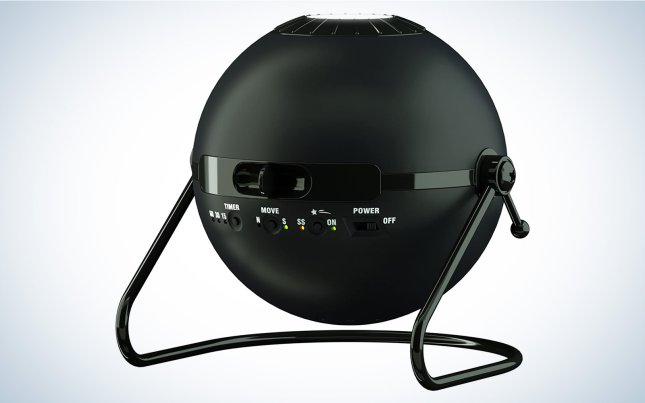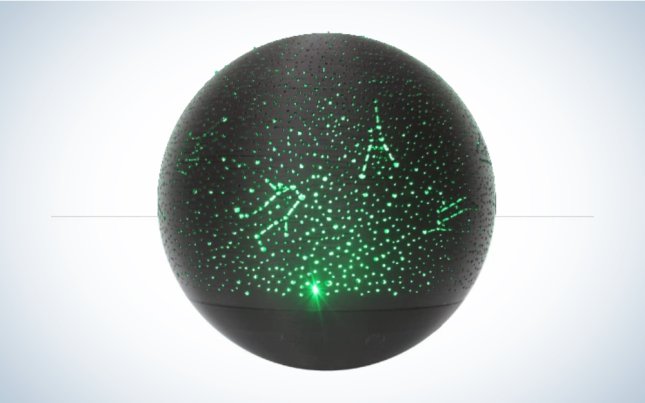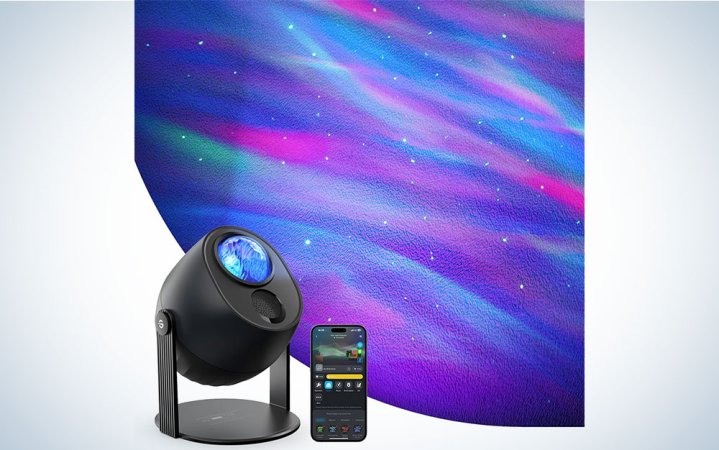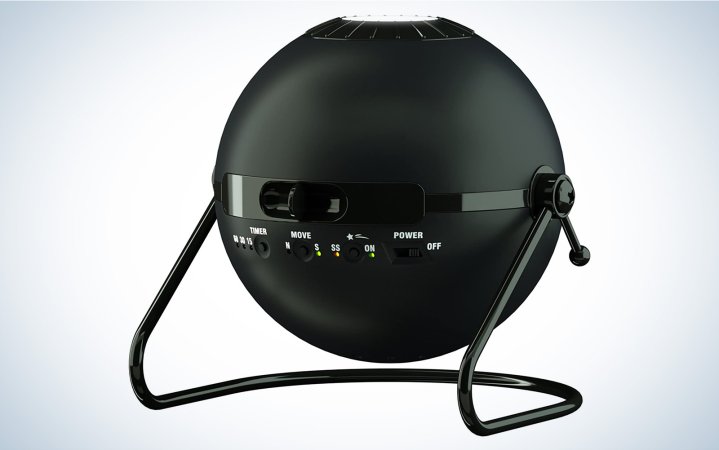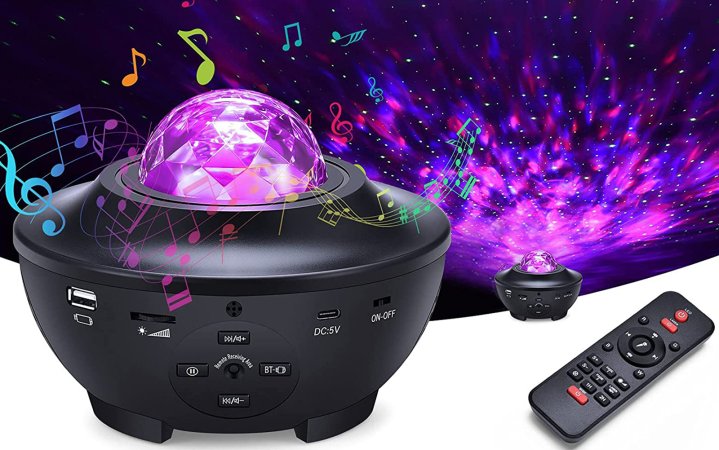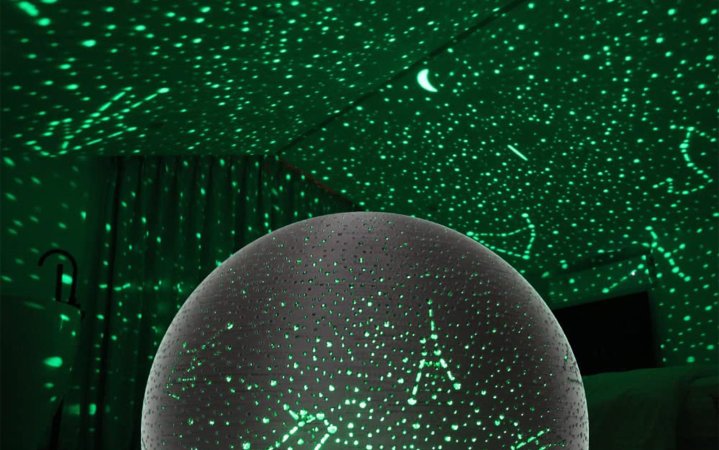We may earn revenue from the products available on this page and participate in affiliate programs. Learn more ›

Beyond a few bright celestial objects, the rise of light pollution has made it difficult for most people to experience a genuinely starry night sky—and that’s where star projectors come in. If artificial lights have obscured your view of the Milky Way, these compact devices provide a fun and comfortable way to observe the cosmos. All you need is a dark room with a power outlet and you’re ready to bask in the wonders of the universe. We’ve chosen the Govee Star Light Projector as our best overall pick for its balance of performance and price. Many also function as night lights or pattern projectors that can spruce up a room without the celestial theme. While nothing can replace the awe-inspiring feeling of seeing millions of stars in person, the best star projectors can still leave you transfixed.
- Best overall: Govee Star Light Projector
- Best splurge: Sega Toys Homestar Flux
- Best for kids: Gdnzduts Galaxy Projector
- Best budget: Infmetry Star Projector
How we chose the best star projectors
I’ve been fortunate to visit areas less affected by light pollution, so I know what it’s like to gaze upon the grandeur of our galaxy. As an editor at TechnoBuffalo, I visited NASA’s Jet Propulsion Lab in Pasadena, Calif., to learn about the Mars rover. I also took a guided tour of the Goldstone Deep Space Communications Complex, where I saw enormous satellites used to communicate with faraway spacecraft. Over the last 10 years, I’ve written about gadgets and space for outlets like CNN Underscored, TechnoBuffalo, and Popular Science, and this guide, in a way, allows me to write about both. If you’re searching for a projector for movie night, you’re in the wrong place (though we do have a guide for the best projectors, the best home theater projectors, and the best outdoor projectors). But if you enjoy the stars of the sky as much as you do the stars of the screen, read on.
The best star projectors: Reviews & Recommendations
Whether you’re looking to liven up your space with colorful lights or follow in the footsteps of Carl Sagan, a star projector is a novel way to explore the cosmos. When making our picks, we found a balance between fantastical projectors, options for kids and adults, and a more scientifically accurate model that’s great for those who love astronomy.
Best overall: Govee Star Light Projector
Pros
- High-quality image
- 16 million colors
- Cool motion settings
- Built-in Bluetooth speaker
- More than 50 scene modes
- Works with smart assistants
Cons
- Not bult for an accurate star depiction
- Speaker audio quality is underwhelming
Specs
- Dimensions: 6″L x 6.3″W x 8.6″H
- Weight: 2.7 pounds
- Power: USB
If you want to create an impressive celestial display on your ceiling, this is the best mix of performance and price. The projector uses a dual-LED light source to create a 650 square-foot light display. You can program more than 50 different modes, most of which are meant to set a mood rather than show an accurate depiction of the night sky. A built-in Bluetooth speaker can play music from a phone or one of 18 white noise tracks.
This isn’t built to recreate the night sky with any real accuracy (our Best Splurge pick is much better in that regard). It does set a great mood, though. The aurora modes create calming motion that’s great to have on when you’re chilling out. It’s great for kids as well as adults.
Best splurge: Sega Toys Homestar Flux
Explore the Galaxy
Pros
- Supports multiple discs
- Projects up to 60,000 stars at once
- Great educational tool
Cons
- Expensive
Why it made the cut: Sega’s Homestar Flux features the most scientifically accurate images out of all the star projectors we picked.
Specs
- Dimensions: 6.3 x 6.3 x 5.9 inches (LWH)
- Weight: 1.36 pounds
- Power: USB
Sega’s Homestar Flux is the closest thing to a planetarium if you’re a fan of astronomy and intend to use your star projector as an educational tool. It can project up to 60,000 stars at once and covers a circle with a 106-inch diameter. Unlike the other star projectors on this list, Sega’s model supports interchangeable discs, allowing owners to explore different parts of the universe in incredible detail. The Homestar Flux comes with two discs, the Northern Hemisphere and the Northern Hemisphere with constellation lines; it also supports additional discs that feature the Andromeda Galaxy, the southern hemisphere, and more.
These discs contain data from different missions of the National Aeronautics and Space Administration (NASA), the National Oceanic and Atmospheric Administration (NOAA), and the United States Naval Observatory (USNO). While Sega’s projector is pricey, it features the most scientifically accurate experience and is a must-have for would-be astronomers.
brary. However, you shouldn’t get your hopes up where audio fidelity is concerned—consider this a fun bonus feature. If you want to take a star projector to a friend’s place or on vacation, this is the one to grab.
Best for kids: Gdnzduts Galaxy Projector
Do-it-all
Pros
- Built-in speaker
- Shutoff timer
- Brightness controls
Cons
- Doesn’t show constellations
Why it made the cut: This galaxy projector features brightness controls and a shutoff timer, plus it doubles as a colorful night light.
Specs
- Dimensions: 6.45 x 6.45 x 4.92 (LWH)
- Weight: 0.61 pounds
- Power: USB
This simple galaxy projector features 21 lighting effects, a shutoff timer, brightness controls, and doubles as a night light. That way, you can find the right effect you like, adjust the brightness, and set a timer before bed. You can also toggle the lasers on and off, turning off the stars and letting the nebula-like effect lull you to sleep. The Galaxy Projector also comes with a remote, making it easy for kids to operate. Whether you want to inspire your kid’s imagination or keep them feeling safe with a night light, the Galaxy Projector is an excellent choice.
Best budget: Infmetry Star Projector
Affordable stargazing
Pros
- Affordable
- Five brightness modes
- Shutoff timer
Cons
- No nebula or aurora features
Why it made the cut: Infmetry’s Star Projector offers an array of features at an affordable price.
Specs
- Dimensions: 7.1 x 7.1 x 7.5 inches (LWH)
- Weight: 1.37 pounds
- Power: USB
Infantry’s Star Projector casts 360 degrees of light through a precut dome, creating a night sky-like effect. This model also supports five brightness modes, a breathing mode, and four colors (white, yellow, blue, and green). There’s also a shutoff timer, so you can fall asleep with the projector on and wake up with it off. It’s not nearly as captivating as the other options on this list, but for the price, it’s a fun way to introduce someone to the wonders of the universe.
What to consider when buying the best star projectors
Generally, cheap star projectors are novelties that emit a mix of colorful swirling LED lights and class 2 lasers, which are low-power visible lasers—the same type used in laser pointers. While most models aren’t scientifically accurate, they provide a fanciful escape and can offer a calming experience. However, if you’re serious about astronomy and willing to spend more, you can find a star projector that can turn your room into a personal planetarium.
Most models we researched offer features like brightness and color controls, image rotation, and an automatic shut-off timer. We found picking the right star projector is more about finding the experience that matches your mood. Are you looking for the cosmic color of nebulae? What about scientifically accurate constellations? Whatever you’re after, there’s a star projector for everyone.
Projection type
You’d think that a star projector only projects, well, stars. But many of them can cover the broad cosmic spectrum and mimic everything from nebulae to auroras to constellations. As we mentioned, picking the right one is about capturing your interest and imagination. A projector that can cast a nebula or aurora is an excellent choice if you want to create a calming environment before going to sleep. A star projector with more scientifically accurate images is ideal for studying and educational use.
Brightness control
A good star projector uses an LED bulb and offers multiple brightness settings. While star projectors are most effective in a dark room, the models that project nebula and aurora make for great complementary lighting, such as during a party or movie night. They also make for good night lights and can help create a calming environment that encourages rest.
Color settings
In addition to adjusting brightness, most star projectors offer different color settings, similar to smart light bulbs. Users can create a scene that fits their mood through advanced color settings and change it with the press of a button. A green aurora may be suitable for calm and tranquility, while yellow may be ideal for happiness and optimism. Most star projectors allow color adjustments through a controller or smartphone app and support millions of color options.
Still vs. rotating
Star projectors generally offer different viewing modes: still and rotating. A projector that operates in still mode will cast light onto a surface and remain static. A projector with a rotating feature will put on a more dynamic light show by slowly rotating the lights. Many of the models we looked at are capable of switching between still and rotating modes.
Extra features
Beyond simply projecting lights onto a wall, some star projectors include extra features like white noise, app support, and shutoff timers. Some models can even be synced with your music so that you can put on a cosmic light show. While these features aren’t necessary, they make specific models more appealing, especially if you intend to use a star projector in a child’s room, because it can act as a night light and white noise machine and then shut off after a few hours.
FAQs
Star projectors can start at $10 and go up to the $150-$200 range, depending on quality and additional features. For example, something that provides a planetarium-like experience will be more expensive than one that has constellations etched into the cover.
Yes, you can use a star projector on any wall in your home. These projectors typically have a short throw, which essentially means they need to be relatively close to the surface they’re projecting onto (between 6-10 feet). We recommend pointing your star projector at a blank wall or ceiling so that you can enjoy the maximum effect of the colorful lights without distractions.
For an evenly lit ceiling, you should try to put the star projector in the center of your room. We realize that’s not ideal for most people, so any place you have an outlet is a good spot. There’s no wrong place to put a star projector, as long as it’s not too close to the surface it’s projecting onto. What works and looks best to you may not be the same for someone else.
Star projectors are appropriate for any age and generally offer the same features or designs, whether for a kid or an adult. There are some variations if you do want one for a specific age group. For example, some models might come with imagery, such as an astronaut or spaceship, aimed at younger audiences. Meanwhile, projectors that offer scientifically accurate images might only appeal to adults or people who are enthusiastic about astronomy. If you’re purchasing a star projector for someone, you must consider their interests to get the most out of what you buy.
If the imagery and colors of a star projector make you feel more relaxed, then you should use it as a night light. While not their intended purpose, many models we researched feature brightness and timer settings, making them suited for bedtime use. Some also have built-in sound machines, which some people claim help them fall asleep and stay asleep.
Final thoughts on the best star projectors
- Best overall: Govee Star Light Projector
- Best splurge: Sega Toys Homestar Flux
- Best for kids: Gdnzduts Galaxy Projector
- Best budget: Infmetry Star Projector
Star projectors are a fun and affordable way to add bright, colorful lights to your bedroom. That said, most are nothing more than novelties and put on light shows that vaguely resemble nebulae and auroras. If you’re searching for something with more scientifically accurate imagery, you can find some excellent options if you don’t mind spending more money. Better yet, we recommend traveling to a place unaffected by light pollution and experiencing the feeling of seeing millions of stars in person.
